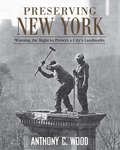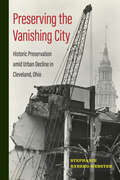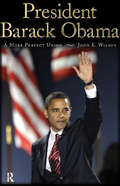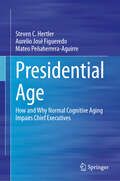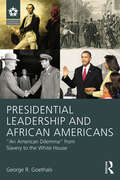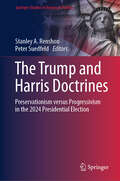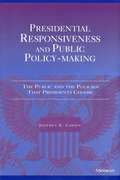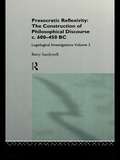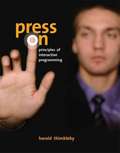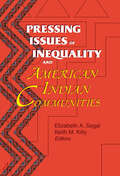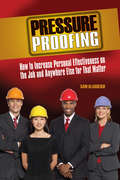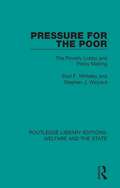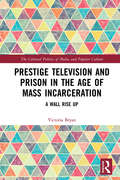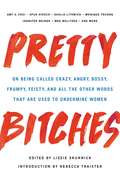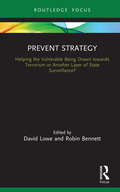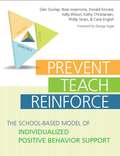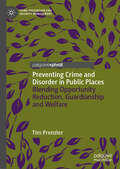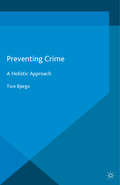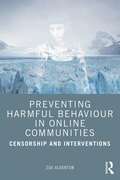- Table View
- List View
Preserving Neighborhoods: How Urban Policy and Community Strategy Shape Baltimore and Brooklyn
by Aaron PassellHistoric preservation is typically regarded as an elitist practice. In this view, designating a neighborhood as historic is a project by and for affluent residents concerned with aesthetics, not affordability. It leads to gentrification and rising property values for wealthy homeowners, while displacement afflicts longer-term, lower-income residents of the neighborhood, often people of color.Through rich case studies of Baltimore and Brooklyn, Aaron Passell complicates this story, exploring how community activists and local governments use historic preservation to accelerate or slow down neighborhood change. He argues that this form of regulation is one of the few remaining urban policy interventions that enable communities to exercise some control over the changing built environments of their neighborhoods. In Baltimore, it is part of a primarily top-down strategy for channeling investment into historic neighborhoods, many of them plagued by vacancy and abandonment. In central Brooklyn, neighborhood groups have discovered the utility of landmark district designation as they seek to mitigate rapid change with whatever legal tools they can. The contrast between Baltimore and Brooklyn reveals that the relationship between historic preservation and neighborhood change varies not only from city to city, but even from neighborhood to neighborhood. In speaking with local activists, Passell finds that historic district designation and enforcement efforts can be a part of neighborhood community building and bottom-up revitalization.Featuring compelling narrative interviews alongside quantitative data, Preserving Neighborhoods is a nuanced mixed-methods study of an important local-level urban policy and its surprisingly varied consequences.
Preserving New York: Winning the Right to Protect a City’s Landmarks
by Anthony WoodPreserving New York is the largely unknown inspiring story of the origins of New York City’s nationally acclaimed landmarks law. The decades of struggle behind the law, its intellectual origins, the men and women who fought for it, the forces that shaped it, and the buildings lost and saved on the way to its ultimate passage, span from 1913 to 1965. Intended for the interested public as well as students of New York City history, architecture, and preservation itself, over 100 illustrations help reveal a history richer and more complex than the accepted myth that the landmarks law sprang from the wreckage of the great Pennsylvania Station. Images include those by noted historic photographers as well as those from newspaper accounts of the time. Forgotten civic leaders such as Albert S. Bard and lost buildings including the Brokaw Mansions, are unveiled in an extensively researched narrative bringing this essential episode in New York’s history to future generations tasked with protecting the city’s landmarks. For the first time, the story of how New York won the right to protect its treasured buildings, neighborhoods and special places is brought together to enjoy, inform, and inspire all who love New York.
Preserving the Vanishing City: Historic Preservation amid Urban Decline in Cleveland, Ohio (Urban Life, Landscape and Policy)
by Stephanie Ryberg-WebsterPreserving the Vanishing City considers the unique challenges, conditions, and opportunities facing Cleveland’s historic preservation community during the 1970s and 1980s. While pro-preservationists argued for the economic and revitalization benefits stemming from saving and repurposing older buildings, population loss and economic contraction prompted decades of deterioration, underinvestment, vacancy, and abandonment. Stephanie Ryberg-Webster uncovers the motivations, strategies, and constraints driving Cleveland’s historic preservation sector, led by the public-sector Cleveland Landmarks Commission, nonprofit Cleveland Restoration Society, and a cadre of advocates. She sheds light on the ways in which preservationists confronted severe, escalating, and sustained urban decline, which plagued Cleveland, a prototypical rust-belt industrial city. Preserving the Vanishing City chronicles the rise of the historic preservation profession in Cleveland and provides six case studies about targeted projects and neighborhood efforts, including industrial heritage, housing preservation and restoration, commercial district revitalization, securing local historic district designations, as well as grassroots organizing, coalition building, and partnerships. Ryberg-Webster also addresses the complexities of historic preservation within the context of rapid racial change in Cleveland’s neighborhoods. A comprehensive history of preservation within the context of one city’s urban decline, Preserving the Vanishing Cityrecounts the successes, failures, and creative strategies employed to save Cleveland’s built environment.
Preserving the Vanishing City: Historic Preservation amid Urban Decline in Cleveland, Ohio (Urban Life, Landscape and Policy)
by Stephanie Ryberg-WebsterPreserving the Vanishing City considers the unique challenges, conditions, and opportunities facing Cleveland’s historic preservation community during the 1970s and 1980s. While pro-preservationists argued for the economic and revitalization benefits stemming from saving and repurposing older buildings, population loss and economic contraction prompted decades of deterioration, underinvestment, vacancy, and abandonment. Stephanie Ryberg-Webster uncovers the motivations, strategies, and constraints driving Cleveland’s historic preservation sector, led by the public-sector Cleveland Landmarks Commission, nonprofit Cleveland Restoration Society, and a cadre of advocates. She sheds light on the ways in which preservationists confronted severe, escalating, and sustained urban decline, which plagued Cleveland, a prototypical rust-belt industrial city. Preserving the Vanishing City chronicles the rise of the historic preservation profession in Cleveland and provides six case studies about targeted projects and neighborhood efforts, including industrial heritage, housing preservation and restoration, commercial district revitalization, securing local historic district designations, as well as grassroots organizing, coalition building, and partnerships. Ryberg-Webster also addresses the complexities of historic preservation within the context of rapid racial change in Cleveland’s neighborhoods. A comprehensive history of preservation within the context of one city’s urban decline, Preserving the Vanishing Cityrecounts the successes, failures, and creative strategies employed to save Cleveland’s built environment.
President Barack Obama: A More Perfect Union
by John K. WilsonBarack Obama's "improbable quest" has become a fact of American life and a benchmark in American history. Striving now toward "a more perfect union," Obama and the nation confront obstacles unforeseen at the outset of the 2008 electoral campaign. John K. Wilson tracks the sweep of this progress from the beginning of Obama's political career through his move into the White House. With his critical journalistic eye and his sympathetic "native son" perspective, Wilson shows us a side of Obama we haven't seen as well as a view of the media we need to understand-even more now as the Obama administration begins to govern. The paperback edition of this popular book includes a new introduction, updates throughout, and two new chapters on the electoral victory and the transition from campaigning into governing. New photos and new insights include a focus on the continued importance of race in American politics.
Presidential Age: How and Why Normal Cognitive Aging Impairs Chief Executives
by Steven C. Hertler Aurelio José Figueredo Mateo Peñaherrera-AguirreThis book on presidential age is not about Alzheimer's Disease and associated pathologies of the aging brain. It is instead about the normally aging brain. Brains don’t simply develop and maintain their functionality into older adulthood unless otherwise impaired by neurocognitive disease. Were this the case, this book might be about leveraging prodromal biomarkers of neurodegenerative diseases to screen prospective presidential candidates. Instead, the normal decline age brings to all human brains begs a different type of book—and a broader and more blanketed warning about electing increasingly older presidents.
Presidential Leadership and African Americans: "An American Dilemma" from Slavery to the White House (Leadership: Research and Practice)
by George R. GoethalsPresidential Leadership and African Americans examines the leadership styles of eight American presidents and shows how the decisions made by each affected the lives and opportunities of the nation’s black citizens. Beginning with George Washington and concluding with the landmark election of Barack Obama, Goethals traces the evolving attitudes and morality that influenced the actions of each president on matters of race, and shows how their personal backgrounds as well as their individual historical, economic, and cultural contexts combined to shape their values, judgments, and decisions, and ultimately their leadership, regarding African Americans.
Presidential Leadership and Foreign Policy: Comparing the Trump and Biden Doctrines (Springer Studies in American Politics)
by Stanley A. Renshon Peter SuedfeldThe 2024 U.S. presidential election will hinge on two very different basic approaches to domestic and foreign policy, two very different sets of underlying premises, and two very different types of presidential and high-level official personalities at the administrative helm putting them into effect. Republican presidential nominee Donald Trump is campaigning on a nationalist conservative preservation platform. It is a direct antithesis of the Biden-Harris- Waltz progressive transformation agenda. This volume comparatively analyzes the choices of presidential doctrine that are likely to define the principles, beliefs, and nature of U.S. foreign policy in the years following the election of either candidate and their vastly different agendas.
Presidential Responsiveness and Public Policy-making
by Jeffrey E. CohenFrom routine operations to the workings of a White House in crisis, this comprehensive, best-selling text examines all aspects of the presidency in rich detail. With a special emphasis on policy, the new edition surveys the most up-to-date scholarship on the topic, and includes an examination of the groundbreaking 2008 presidential election. Taking a theoretical approach, the authors use engaging analysis and timely, fascinating examples to view the presidency from two theoretical standpoints--the president as "facilitator," and the president as "director of change."
Presocratic Reflexivity: Logological Investigations: Volume Three (Logological Investigations Ser. #Vol. 3)
by Barry SandywellIn this third Volume of Logological Investigations Sandywell continues his sociological reconstruction of the origins of reflexive thought and discourse with special reference to pre-Socratic philosophy and science and their socio-political context.
Press On: Principles of Interaction Programming
by Harold ThimblebyInteractive systems and devices, from mobile phones to office copiers, do not fulfill their potential for a wide variety of reasons--not all of them technical. Press On shows that we can design better interactive systems and devices if we draw on sound computer science principles. It uses state machines and graph theory as a powerful and insightful way to analyze and design better interfaces and examines specific designs and creative solutions to design problems. Programmers--who have the technical knowledge that designers and users often lack--can be more creative and more central to interaction design than we might think. Sound programming concepts improve device design. Press On provides the insights, concepts and programming tools to improve usability. Knowing the computer science is fundamental, but Press On also shows how essential it is to have the right approaches to manage the design of systems that people use. Particularly for complex systems, the social, psychological and ethical concerns--the wider design issues--are crucial, and these are covered in depth. Press On highlights key principles throughout the text and provides cross-topic linkages between chapters and suggestions for further reading. Additional material, including all the program code used in the book, is available on an interactive web site. Press On is an essential textbook and reference for computer science students, programmers, and anyone interested in the design of interactive technologies.
Pressing Issues of Inequality and American Indian Communities
by Elizabeth Segal Keith KiltyA much-needed, indispensable volume for anyone involved in the social services or human services field, Pressing Issues of Inequality and American Indian Communities supplies you with vital information that will assist you in offering culturally sensitive services to your clients. You will gain a new perspective from the blending of traditional academic research with the voices of those most intimately affected. From Pressing Issues of Inequality and American Indian Communities, you will learn proven methods that will help you offer successful and effective services to your Native American clients.Pressing Issues of Inequality and American Indian Communities reveals the stark realities facing American Indian people today. Through this compelling book you will gain new insight into the challenges presented to Native Americans and how to help your clients face these challenges by: learning how to assist American Indian families through an increased understanding of the new time-limited welfare assistance that generally only impacts them if they live off the reservation examining how poverty and a lack of infrastructure and social services exacerbates the problems Navajo women face when leaving violence in their homes using the positive power of language through case examples of American Indian women to understand how stories and their implications change significantly depending on if they are interpreted from a deficit or strength perspectiveFrom the information in Pressing Issues of Inequality and American Indian Communities, you will gain new insight into specific problems facing American Indian people, including welfare reform’s devastating effects on American Indians trying live off the reservation and the impact of reservation isolation on domestic violence. The information in Pressing Issues of Inequality and American Indian Communities will help you provide culturally sensitive services to Native Americans and assist them in increasing their quality of life.
Pressure Proofing: How to Increase Personal Effectiveness on the Job and Anywhere Else for that Matter
by Sam KlarreichDo you feel uneasy when you try to relax? Are you overwhelmed by the deadlines you have to meet? Do you get rattled when things don’t go your way? Are you inpatient with people who work more slowly than you? Do you often get angry? Do you feel things are hopeless? Do you feel like not getting out of bed, instead pulling the covers over your head? More and more people have these reactions, in spite of the fact that we know more about pressure, anxiety, anger, and depression, and in spite of the fact that computers are supposed to make our lives and jobs easier. For the individual, these unhealthy reactions can lead to deteriorating health and a variety of social problems. For an organization, it often means low employee morale and declining productivity. In Pressure Proofing, Dr. Klarreich tackles the many people problems in the workplace and anywhere else for that matter. He shows how to identify the thoughts that bring on unhealthy reactions, and how to turn those thoughts around by debunking. Drawing on years of experience as a clinical psychologist, Dr. Klarreich then shows us, using quizzes, case histories, and practical programs, how these reactions can be conquered so that we can regain our health, productivity, and personal effectiveness. Pressure Proofing provides an inspiring, empowering, and engaging approach to addressing these issues.
Pressure for the Poor: The Poverty Lobby and Policy Making (Routledge Library Editions: Welfare and the State #24)
by Paul F. Whiteley Stephen J. WinyardOriginally published in 1987 Pressure for the Poor looks at the debate surrounding the role of pressure groups in policy making. It closely relates theories of pressure group behaviour with the findings of research into the poverty lobby in the UK. The analysis is based on interviews with leading activists in more than forty interest groups, which are all concerned with trying to influence social security policies of government in the field of income maintenance. The book examines the origins and maintenance of such a wide range of interest groups in in this field, the strategies they pursue, and their impact on policy outcomes.
Prestige Television and Prison in the Age of Mass Incarceration: A Wall Rise Up (The Cultural Politics of Media and Popular Culture)
by Victoria M. BryanTelevision shows that we might call ‘prestige television’ represent prison in ways that are sometimes reductive, sometimes powerful, and sometimes exceedingly complex. This book examines various programmes across the genres of drama, comedy and horror that utilize prison or places of incarceration as a central theme or setting to show how they conform to or challenge the standard conversation about the prison industrial complex and the common understanding of prisons as violent spaces where we house the worst among us. Drawing on the work of Angela Davis, Doran Larson, Dylan Rodriguez, Michelle Alexander, and Lisa Guenther, the author presents focused studies of Orange Is the New Black, Rectify, American Horror Story and The Walking Dead (along with briefer discussions of The 100, police procedurals, and popular sitcoms) to explore the responsibility of television to represent prison in as authentic a fashion as possible, the exploitation of the incarcerated in reductive representations of prison, and the shifting nature of the national conversation about prison as it is depicted on screen. As such, the book will appeal to scholars of cultural and media studies, criminology and sociology with interests in incarceration and representations of prison in popular culture.
Pretend the World Is Funny and Forever: A Psychological Analysis of Comedians, Clowns, and Actors
by S. Fisher R. L. FisherFirst published in 1982. Routledge is an imprint of Taylor & Francis, an informa company.
Pretty Bitches: On Being Called Crazy, Angry, Bossy, Frumpy, Feisty, and All the Other Words That Are Used to Undermine Women
by Lizzie SkurnickThese empowering essays from leading women writers examine the power of the gendered language that is used to diminish women -- and imagine a more liberated world.Words matter. They wound, they inflate, they define, they demean. They have nuance and power. "Effortless," "Sassy," "Ambitious," "Aggressive": What subtle digs and sneaky implications are conveyed when women are described with words like these? Words are made into weapons, warnings, praise, and blame, bearing an outsized influence on women's lives -- to say nothing of our moods.No one knows this better than Lizzie Skurnick, writer of the New York Times' column "That Should be A Word" and a veritable queen of cultural coinage. And in Pretty Bitches, Skurnick has rounded up a group of powerhouse women writers to take on the hidden meanings of these words, and how they can limit our worlds -- or liberate them. From Laura Lipmann and Meg Wolizer to Jennifer Weiner and Rebecca Traister, each writer uses her word as a vehicle for memoir, cultural commentary, critique, or all three. Spanning the street, the bedroom, the voting booth, and the workplace, these simple words have huge stories behind them -- stories it's time to examine, re-imagine, and change.
Pretty-shield: Medicine Woman of the Crows
by Frank B. LindermanPretty-shield, the legendary medicine woman of the Crows, remembered what life was like on the Plains when the buffalo were still plentiful. A powerful healer who was forceful, astute, and compassionate, Pretty-shield experienced many changes as her formerly mobile people were forced to come to terms with reservation life in the late nineteenth century. Pretty-shield told her story to Frank Linderman through an interpreter and using sign language. The lives, responsibilities, and aspirations of Crow women are vividly brought to life in these pages as Pretty-shield recounts her life on the Plains of long ago. She speaks of the simple games and dolls of an Indian childhood and the work of the girls and women―setting up the lodges, dressing the skins, picking berries, digging roots, and cooking. Through her eyes we come to understand courtship, marriage, childbirth and the care of babies, medicine-dreams, the care of the sick, and other facets of Crow womanhood. Alma Snell and Becky Matthews provide a new preface to this edition.
Prevent Strategy: Helping the Vulnerable being drawn towards Terrorism or Another Layer of State Surveillance? (Routledge Advances in Sociology)
by David Lowe Robin BennettPrevent Strategy is a collection of work from practitioners (youth workers and the police) and academics researching Prevent covers overcoming the stigma attached to Prevent being implicitly racist, problems related to the section 26 duty, training staff on Prevent, creating safe spaces to have open discussions, problems regarding extremists’ online activity and the law surrounding freedom of expression. Since its introduction the UK’s Prevent strategy has been surrounded with controversy ranging from making the Muslim community a dangerous ‘suspect community’ to being another layer of police surveillance on individuals who have not been arrested or convicted of a crime. Despite amendments having to the strategy that now covers all forms of extremism and in adopting a multi-agency approach these suspicions remain, exacerbated by the section 26 Counter-Terrorism and Security Act 2015 duty to prevent vulnerable people being drawn towards terrorism. The knowledge, views and findings on the Prevent strategy from the respective contributors will appeal to all staff in education, health service and criminal justice agencies who carry out the section 26 duty and academics and students studying the area of terrorism and security.
Prevent-Teach-Reinforce: The School-Based Model of Individualized Positive Behavior Support
by Glen Dunlap Rose Lovannone Carie English Donald Kincaid Kelly Wilson Kathy Christian Phillip StrainSolve serious behavior challenges in K-8 classrooms with this easy-to-use book, the first practical guide to the research-proven Prevent-Teach-Reinforce (PTR) model. Developed by some of the most respected authorities on positive behavior support, this innovative model gives school-based teams a five-step plan for reducing problems unresolved by typical behavior management strategies. With this thorough blueprint for PTR, education professionals will learn how to prevent behavior problems by adjusting the curriculum and environment; teach proactive communication skills; and reinforce prosocial behavior and academic achievement. This highly successful model is proven effective by research and field testing in real classrooms PTR was shown to reduce behavior problems and increase evidence of social skills and academic engagement detailed and explicit, with five systematic steps that take educators beyond tips and strategies (see box) consistent with the popular positive behavior support approach and derived from the principles and many procedures of applied behavior analysis easily adaptable to the needs and goals of each individual student effective for a wide variety of students: typically developing students and those who have autism, learning disabilities, intellectual disabilities, emotional and behavioral disorders, and other challenges On the included CD-ROM are all the printable forms and tools needed to implement PTR, such as Behavior Support Plan templates and a Functional Behavioral Assessment. With this comprehensive model, education professionals will resolve even the toughest classroom behavior challenges and remove a significant barrier to effective teaching and student achievement.
Preventing Challenging Behavior in Your Classroom
by Matt Tincani"Preventing Challenging Behavior in Your Classroom: Positive Behavior Support and Effective Classroom Management" focuses on practical strategies to prevent and reduce behavior problems and enhance student learning, particularly Positive Behavior Support (PBS). This book discusses the myths and facts of effective classroom management, provides an overview of the conceptual and empirical basis of PBS, and describes PBS interventions from peer-reviewed research, highlighted in easy-to-understand language to facilitate teachers' knowledge of evidence-based techniques. Real-world examples are provided in conjunction with recommendations to enhance teachers' understanding and implementation of PBS.
Preventing Crime and Disorder in Public Places: Blending Opportunity Reduction, Guardianship and Welfare (Crime Prevention and Security Management)
by Tim PrenzlerThis accessible, short book provides scientifically informed guidance on effective wholistic place management strategies for preventing crime. It integrates theoretical perspectives and practical examples of crime prevention methods that can be readily implemented by responsible stakeholders. It covers locations including town centers, shopping malls, parks, beaches, transit hubs, campuses, stadiums and entertainment precincts, where security programs sometimes attract criticism regarding the exclusion or persecution of marginalized groups. This book advocates for overlapping forms of crime prevention and social support that address the need to make large improvements in safety in public places while supporting marginalized and vulnerable groups. Readers are exposed to a wide range of successful case studies as well as the central role of a systematic problem-solving methodology. It speaks to crime prevention and social services professionals, academics, and students, as well as interested members of the public.
Preventing Crime: A Holistic Approach (Crime Prevention and Security Management)
by Tore BjørgoTraditional "schools" of crime prevention, like the criminal justice model, social crime prevention or situational crime prevention, have proved to be too narrow and do not combine well with other approaches. However, each of these models provides important insights and contributions for reducing crime. By extracting the main preventive mechanisms of these diverse approaches, this book develops a more holistic, general model that consists of nine preventive mechanisms: building normative barriers to crime, reducing recruitment, deterrence, disruption, incapacitation, protecting vulnerable targets, reducing benefits of crime, reducing harm, and facilitating desistance. The measures to activate the preventive mechanisms may differ according to the type of crime, as may the actors in charge of implementing the relevant measures. However, Tore Bjørgo demonstrates how his model of crime prevention can be effectively applied to diverse forms of crime, from domestic burglaries to criminal youth gangs and driving under the influence to organized crime and terrorism. In doing so, this important book will be of interest to scholars and students of policing, security studies and criminology, as well as practitioners and policy-makers.
Preventing Harmful Behaviour in Online Communities: Censorship and Interventions
by Zoe AldertonPreventing Harmful Behaviour in Online Communities explores the ethics and logistics of censoring problematic communications online that might encourage a person to engage in harmful behaviour. Using an approach based on theories of digital rhetoric and close primary source analysis, Zoe Alderton draws on group dynamics research in relation to the way in which some online communities foster negative and destructive ideas, encouraging community members to engage in practices including self-harm, disordered eating, and suicide. This book offers insight into the dangerous gap between the clinical community and caregivers versus the pro-anorexia and pro-self-harm communities – allowing caregivers or medical professionals to understand hidden online communities young people in their care may be part of. It delves into the often-unanticipated needs of those who band together to resist the healthcare community, suggesting practical ways to address their concerns and encourage healing. Chapters investigate the alarming ease with which ideas of self-harm can infect people through personal contact, community unease, or even fiction and song and the potential of the internet to transmit self-harmful ideas across countries and even periods of time. The book also outlines the real nature of harm-based communities online, examining both their appeal and dangers, while also examining self-censorship and intervention methods for dealing with harmful content online. Rather than pointing to punishment or censorship as best practice, the book offers constructive guidelines that outline a more holistic approach based on the validity of expressing negative mood and the creation of safe peer support networks, making it ideal reading for professionals protecting vulnerable people, as well as students and academics in psychology, mental health, and social care.

